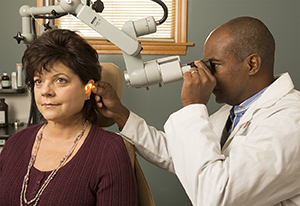A
B
C
D
E
F
G
H
I
J
K
L
M
N
O
P
Q
R
S
T
U
V
W
X
Y
Z
Topic IndexLibrary Index
Click a letter to see a list of conditions beginning with that letter.
Click 'Topic Index' to return to the index for the current topic.
Click 'Library Index' to return to the listing of all topics.
Middle Ear Surgery: At-Home Recovery
The type of surgery you’ve had and your lifestyle will affect how long it takes you to get better. Plan on healing at home for at least 1 to 2 weeks. Your surgeon will tell you when to resume normal activities, often in 2 to 4 weeks. You can do certain things to speed up the healing process. Be sure to call your surgeon if you have any questions or problems.
What you can do
Follow your surgeon’s instructions. Also, keep in mind:
-
Your healthcare provider will tell you when it's OK to shower or bathe. This will depend on the type of surgery you had. You may be instructed to protect your ear with a cotton ball soaked in petroleum jelly to prevent getting water in your ear.
-
Take pain medicines and antibiotics as directed.
-
Sneeze or cough with your mouth open to protect your ear.
-
Talk to your surgeon before flying, traveling to the mountains, swimming, doing aerobics, or playing contact sports. Swimming is generally prohibited for 4 to 6 weeks.
-
Make sure you go to all follow-up appointments with your surgeon. They'll change your bandage and check to make sure your ear is healing.

When to call your healthcare provider
Call your surgeon right away if you have any of the following:
-
Bleeding from the ear that soaks more than 1 bandage
-
Fever of 100.4°F (38°C) or higher, or as directed by your healthcare provider
-
Pain that doesn’t respond to medicine
-
Sudden hearing loss
-
Ongoing dizziness
-
Upset stomach (nausea) or vomiting
-
Weakness or numbness of facial muscles
-
Persistent ear discharge
-
Taste changes
-
Ringing in the ears (tinnitus)
-
Problems with balance
Online Medical Reviewer:
Heather M Trevino BSN RNC
Online Medical Reviewer:
Marianne Fraser MSN RN
Online Medical Reviewer:
Shaziya Allarakha MD
Date Last Reviewed:
3/1/2024
© 2000-2025 The StayWell Company, LLC. All rights reserved. This information is not intended as a substitute for professional medical care. Always follow your healthcare professional's instructions.